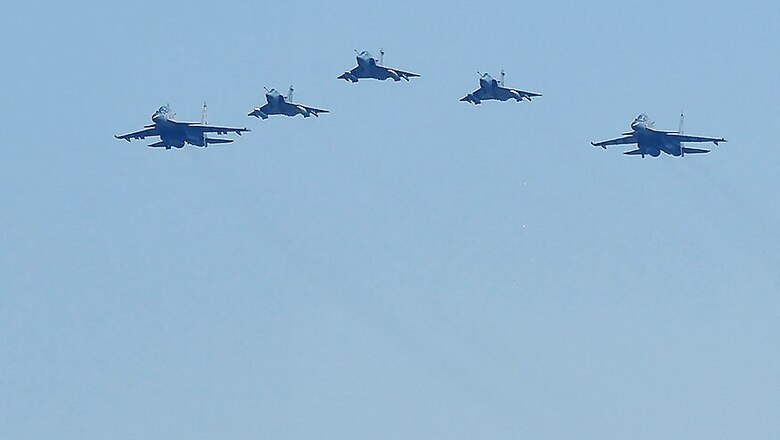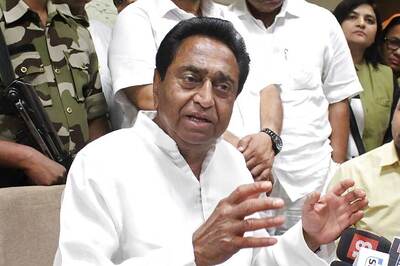
views
It has been one year since Indian war planes crossed the air space of Pakistan, flew over the Neelum Valley and dropped bombs in Balakot, an area of Pakistan adjacent to Muzaffarabad district of Pakistan-administered Kashmir. On the morning of February 26, 2019, the Pakistan military announced that Indians dropped their payload in uninhabited wooded hill top near Balakot.
India, confirming the airstrike later the same day, characterised it to be a pre-emptive strike directed against a terrorist training camp, and causing the deaths of "large number" of terrorists.
No authority could immediately confirm the claim and counter claim, yet in Pakistan, there were few questions raised at that moment on how Indian aircraft entered Pakistan territory, flew unchecked for around 100 miles and dropped “payload” and went back safely?
Balakot is an area quite famous for training of military, non-military and non-state actors. Balakot has been used over the years as a training ground by Pakistani army first during Afghan war fought between Russian and Pakistani proxies, and later between Indian army and militants in Kashmir.
Since the Balakot incident there were rumours, locally, that the Pakistani military authorities cordoned off the area and it was only after a day or two that mediapersons of their choice were allowed at the scene from where they reported “all clear”.
No independent reliable source could confirm the claims or counter claims immediately.
The Pulwama terror attack had generated a very strong global reaction and messages of condemnation created pressure on the Pakistan government. The Jaish had withdrawn its claim of responsibility. The Pakistan government announced that no one had any involvement in the incident. About a week later, Prime minister Imran Khan issued a statement saying the Pakistan government is willing to cooperate in the investigation into the barbaric act.
On one hand, these statements added to confusion within the global community. On the other, when 40 dead bodies of soldiers from different parts of India reached their homes, the entire country was struck with shock and extreme anger.
Few months later, Prime Minister Narendra Modi took a drastic step in Kashmir. On August 5, 2019, Article 370 of the Indian Constitution which provided special status to Jammu and Kashmir was abrogated. On October 31, the Indian Parliament passed another law that divided the areas of J&K into three regions and declared these as union territories.
Prior to all these developments, strictest restrictions were imposed in J&K, all visitors and workers from India were ordered to leave the region immediately while the entire political leadership was put under arrest or house arrest. Many political activists were arrested. Internet services, mobile phones and landline services were suspended. Such was the impact of these restrictions that populations were completely cut off from the outside world.
While these measures were being adopted, the Pakistan-administered Kashmir, the so called falsely termed Azad (Free) Kashmir, did not show much reaction apart from few statements or small scale demonstrations. No other steps were taken either than government and political groups holding meetings after meetings, having routine chats or having photo sessions for local channels and papers.
On the other hand, the Govt of Pakistan seemed completely non-responsive to the entire situation. In September, PM Pakistan Imran Khan addressed the UN General Assembly session where he started his address with a lecture on Islamophobia when most of the hall was empty! He could not make any impression on global community.
In the UNHRC session, Pakistan could not get five members to table a resolution on the situation. Shamefully, later on, when questioned by mediapersons, Pakistan’s foreign minister said categorically that the country did not want to table a resolution on Kashmir.
Earlier on, in a meeting of UNSC, called on the request of China, the consensus was that Kashmir is a bilateral issue that should be resolved between the two countries in accordance with the wishes of the people of J&K. The only concern raised was by China regarding the border areas in Ladakh.
During the UNGA session, Turkish President and the Malaysian PM agreed to call a meeting of like-minded countries in Malaysia. Unfortunately, and to the astonishment of people of J&K, Pakistan PM refused to attend the summit owing to pressure from Saudi Arabia. Another claim that Imran Khan government made that a meeting OIC foreign Ministers was agreed to be held in Pakistan was dismissed under Saudi government pressure.
Recently, an international terrorist, Hafiz Saeed, implicated in Mumbai attacks was given 11 years’ imprisonment for his involvement in the 26/11 Mumbai terror attacks. The ring leader of this attack, Zaki ur Rehman Lakhvi, was given bail in 2015 and he disappeared. Ajmal Kasab who was arrested by Indian authorities stated that he was trained in Pakistan. Later on, then PM Pakistan Nawaz Sharif also indicated Pakistan’s involvement.
In the context of these terrorist activities, the Financial Action Task Force (FATF) put Pakistan on grey list for funding terrorist organisations. On February 17, FATF decided to keep Pakistan in the grey list.
A brief overview of the events since the Balakot incident in 2019 clearly shows a complete failure of the Pakistan regime to prove itself to be a responsible state internationally as well as at the regional level. With recently imposed restrictions on media and now the social media, there is widespread speculation that the government is heading towards a totalitarian regime which would have a devastating effect on the internal situation.
People are fearful that in future they will have to face far more oppressive measures on freedom of speech and choice.
Given the situation, there seems to be no chance of establishing peace in Kashmir. The present regime and its facilitators have adopted a policy of dictator Zia regime - “whoever disagrees is friend of the enemy”. This approach has far-reaching implications that time would reveal. As a native of J&K, my humble wish is that peace must be established in the region and a policy of peaceful coexistence must prevail for the region to prosper and progress. We will have to wait and see, but at the moment it seems a remote possibility.
(The writer is the son of ex-prime minister of Azad Jammu and Ladakh administered by Pakistan. He is a political activist living in UK. He can be reached at [email protected]. Views are personal)



















Comments
0 comment